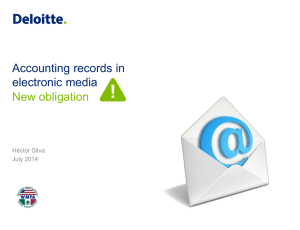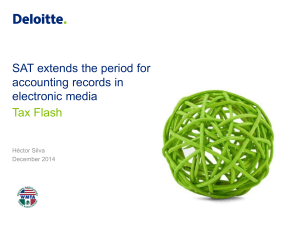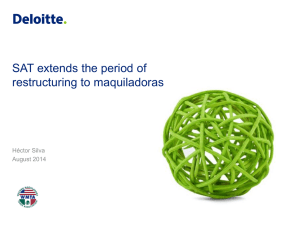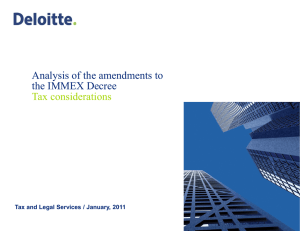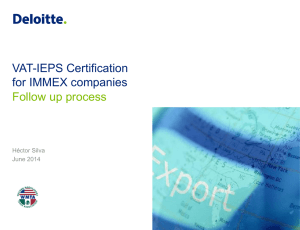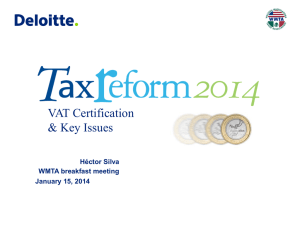The New Decree to facilitate tax compliance in Mexico...[sic
advertisement
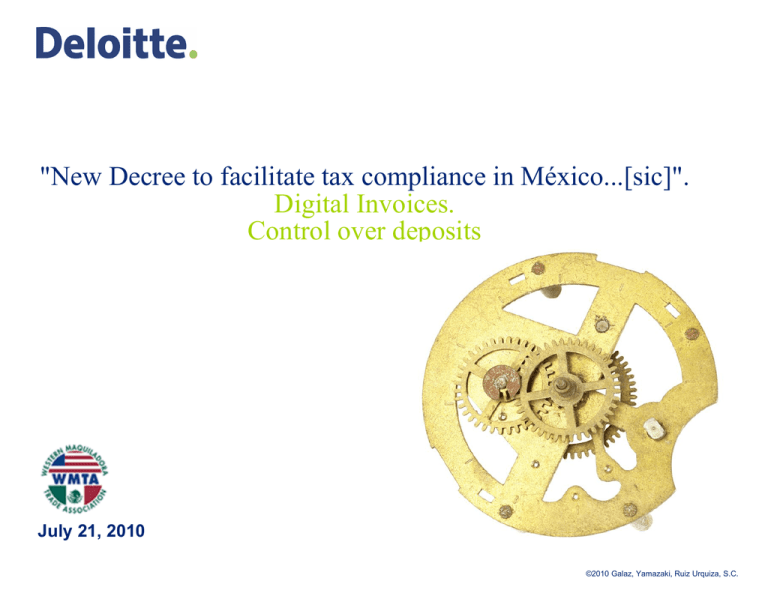
"New Decree to facilitate tax compliance in México...[sic]". Digital Invoices. Control over deposits July 21, 2010 ©2010 Galaz, Yamazaki, Ruiz Urquiza, S.C. Decree Published on June 30 2 ©2010 Galaz, Yamazaki, Ruiz Urquiza, S.C. Decree Simplifying Tax Compliance • Due to complexity of tax compliance • SAT’s analysis identified that taxpayer devote more time to the tax compliance than other countries. • There are recommendations from the World Bank to simplify the tax burden. • A Decree to Simplify Tax Compliance issued by Presidente Calderón was published last June 30 3 ©2010 Galaz, Yamazaki, Ruiz Urquiza, S.C. Decree Simplifying Tax Compliance 1. Opting not to submit a monthly list of the Flat Tax (revenues, deductions and credits) Business Flat Tax (IETU) taxpayers may choose not to submit the information on the concepts that formed the basis for determining the tax (due along with the monthly payment) provided that the report is filed annually within the month immediately following the end of the fiscal year - January. The SAT will release the formats in which such information must be submitted. 4 ©2010 Galaz, Yamazaki, Ruiz Urquiza, S.C. Decree Simplifying Tax Compliance 2. Option not to file VAT information on income tax return Value-added tax (VAT) taxpayers and those who carry out activities taxed at 0% rate may choose not to submit VAT information statements as requested by the income tax return (Article 32, Section VII of the VAT Law), provided that they comply with the obligation to submit monthly operational information with suppliers (DIOT). 5 ©2010 Galaz, Yamazaki, Ruiz Urquiza, S.C. Decree Simplifying Tax Compliance 3. No obligation to have a tax report (dictamen fiscal) to request the return of the Cash Deposit Tax Taxpayers seeking a refund of Cash Deposit Tax, in accordance with the provisions of Article 8, fourth paragraph of the Cash Deposit Tax Law, need not to submit the tax report, provided that they present the information on time and according with additional rules that will be published by the SAT. 6 ©2010 Galaz, Yamazaki, Ruiz Urquiza, S.C. Decree Simplifying Tax Compliance 4. The validity of the certificates of individuals electronic signature (FIEL) is now extended from two to four years 7 ©2010 Galaz, Yamazaki, Ruiz Urquiza, S.C. Decree Simplifying Tax Compliance 5. Option not to deliver the tax opinion for the year 2010 and beyond Taxpayers which in accordance with Article 32-A, Section I of the Federal Tax Code (CFF), are required to audit their financial statements through certified public accountant, as well as those required for purposes of the Social Security (IMSS) may choose not to present the audit report for the year 2010 and subsequent years, provided that they present the information on time and according with general rules to be published. 8 ©2010 Galaz, Yamazaki, Ruiz Urquiza, S.C. Digital Invoices 9 ©2010 Galaz, Yamazaki, Ruiz Urquiza, S.C. Digital Invoices 2009 changes to the Mexican Tax Code included a new procedure to issue invoices for alienation of goods or rendering of services. The new procedure require to issue all invoices in a digital format as from January 1, 2011. Lack of attention to this requirement may disrupt the ongoing of operations. Up to date, taxpayers have the obligation to pre-print in authorized printing shops their invoices or they may obtain authorization from the Mexican tax authorities (SAT) to print their own invoices. 10 ©2010 Galaz, Yamazaki, Ruiz Urquiza, S.C. What the Company needs? Due to the changes to the Tax Code, taxpayers must, as soon as possible and before January 1 (preferably before October 2010): 1. Confirm that an electronic signature (FIEL) with the tax authorities is in force. Otherwise to update the signature. 2. Download from the SAT’s web page the Digital Seal Certification 3. Hire an authorized supplier to obtain a program with the design and procedure to issue the invoices. 4. Alternatively, taxpayers may download the above mentioned program from the SAT’s web page provided that the taxpayer has the necessary equipment and capacity to warranty compliance with the authority’s requirements. 5. Authorized folios will be in force for two years. 6. Necessary controls must be in place to allow storage for further verification of invoices issued. 7. File quarterly reports with the digital invoices issued. 11 ©2010 Galaz, Yamazaki, Ruiz Urquiza, S.C. Continues,, Taxpayers may use the already pre-printed invoices until extinguished or upon its expiration date even after January 1, 2011. It worth mentioning that changes to the Tax Code includes the obligation of taxpayers to verify the validity of digital invoices obtained from suppliers of goods and services. Lack of this verification procedure (which is done in the SAT’s web page) is penalized as tax fraud and of course the deduction is denied. 12 ©2010 Galaz, Yamazaki, Ruiz Urquiza, S.C. Invoicing Process Digital Mechanism Company Make the Invoice SAT or authorized supplier •Check the tax requirements •Folio assigned •Incorporate Digital Seal Company Client Digital Invoice Data Future Base onIndustry the web Scenarios page 13 ©2010 Galaz, Yamazaki, Ruiz Urquiza, S.C. Dollar Transactions 14 ©2010 Galaz, Yamazaki, Ruiz Urquiza, S.C. Limit to deposits within the bank system in foreign currency A resolution amending general provisions referred to Article 115 of the Law on Credit Institutions was published. Now individuals or business with a bank account can deposit in cash up to US$4,000 a month (US$7,000 in the northern border) if they do not have a bank account the limit is US$300 per day and accumulated $1,500 per month. Foreigners with no bank account can change Dollars into Pesos in cash up to US$1,500 per month. 15 ©2010 Galaz, Yamazaki, Ruiz Urquiza, S.C. Foreign currency deposits Bank institutions must submit within the first 10 days of January, April, July and October of each year to Hacienda, a report for each purchase transaction, deposittaking, receiving payment of credit or services, or transfers or state funds, in cash to be made in dollars. The resolution also emphasizes that each institution must retain for a period of not less than 10 years from the date of its execution, a copy of the relevant transaction reports, cash in dollars, unusual, troubling internal and international funds transfers 16 ©2010 Galaz, Yamazaki, Ruiz Urquiza, S.C. Foreign currency deposits Another rule provides that when a user performs some operation on foreign currency cash or traveler's checks, equal or more than $500 or its equivalent in foreign currency in question, the institution must request certain information and preserve it. The resolution came into force on Monday, June 21, however, in regard to their operations of financial institutions with corporations will be effective in 90 calendar days from June 16, 2010. 17 ©2010 Galaz, Yamazaki, Ruiz Urquiza, S.C. Héctor Silva hsilva@deloittemx.com 011 52 (664) 6227840 ©2010 Galaz, Yamazaki, Ruiz Urquiza, S.C.
